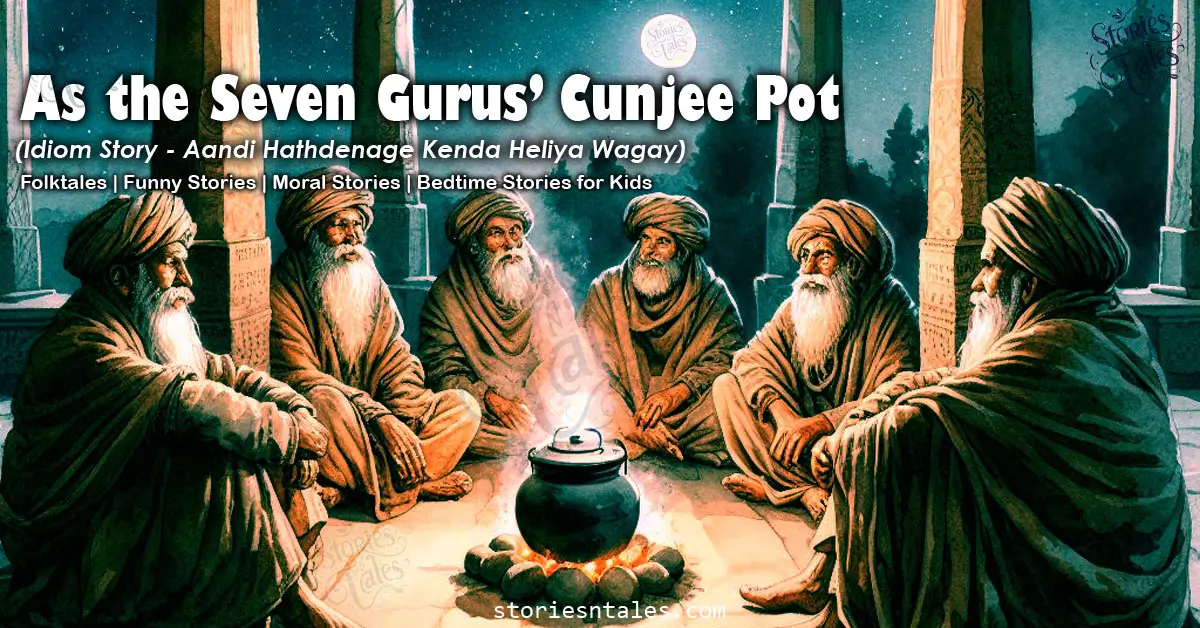The story of the Seven Gurus’ cunjee pot is one of the interesting idiom stories that comes from South Asian folklore and folktales from around the world. The story revolves around a group of gypsies that originated in Kerala, South India, and moved to Sri Lanka. If you are looking for interesting short folktales with a moral lesson and a good sense of humor, this might help. And this can also be added to your collection of bedtime stories for kids.
Once upon a time, in ancient Ceylon, Seven gurus (gypsies) who were traveling on their own different paths met each other at an ambalama, where they chose to stay for the night. Ambalama is like a lodge, built for pilgrims, traders, and travelers to stay the night. So, the seven gurus who were traveling alone coincidentally met at such a place.
Once they met at the Ambalama, they all recognized they were from the same community. They were all making a living by giving prophecies to people by looking at their palms or faces. They were all descendants of their ancestors who lived in South Asia and migrated to Sri Lanka.
Then the next step for staying the night was to make dinner. After a tiring day, they all wanted a good meal. Back in those times, people used to carry the least essentials to cook with them whenever they traveled a long distance. They traveled on foot, with or without carts. So, they would spend the night at an ambalama, resting their tired bodies and start the journey again in the morning. So, these seven gurus also had to cook something.
“There are seven of us here! There is no point in cooking separately. Shall we cook one pot of cunjee?” one asked.
“Yes. Yes. It sounds like a good idea,” everyone else agreed.
“Well then, let’s contribute one handful of rice to the pot from each of us. That will be enough right?” Another one was suggested.
“Agree. Agree,” others replied.
So, the agreement was for each person to contribute one handful of rice to the pot.
One person lit fire in the hearth that was there at the ambalama, built by people who were there previously. Then another one placed a pot on the hearth. Another one brought water from a nearby stream and the other half filled the pot with water. When the water started boiling, they were to put the rice in. So, when the water started boiling, each of the Aadi went to the hearth and put a handful of rice into the pot. Then, until the cunjee was cooked, they got together inside the ambalama and had a chat.
When the cooking time for cunjee passed, they all went to eat with jars in their hands. They looked at the cunjee pot and realized there was no cunjee there. It was only steaming hot water in the pot!
It turns out that no one had contributed rice for the cunjee. Everyone had pretended to put rice in the pot but no one really had. Everyone, all seven of them, had tried to cheat on others and depend on others. Therefore, no rice, no cunjee. And no one could complain about it either. They all pretended to have cunjee, drank hot water for dinner and went to sleep starving.
When people try to cheat each other in work environments, when a team is unsuccessful, when team members are not contributing enough as individuals, when team members are depending too much on others, when a team is made of cunning and lazy individuals, people say, “Aandi Hathdenage Kenda Heliya Wage.” That is how the idiom “like the cunjee pot of seven Aandi” was born.

